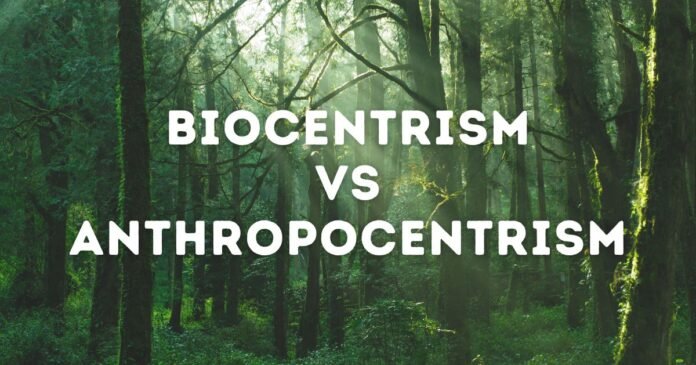The main difference between anthropocentrism, biocentrism, and ecocentrism is that the first considers humans to be the most important aspect of the universe and the earth, while the latter sees all living things as having intrinsic value and considers the ecosystem’s value, which includes both living and non-living elements.
Centrism is a viewpoint that places emphasis on a particular value or group. Anthropocentrism, Biocentrism Debunked, and ecocentrism are three centrism ethics. According to anthropocentrism, humans are seen as the main or most significant entities in the world. Anthropocentrism holds that all other organisms are tools for achieving human goals.
On the other hand, biocentrism and ecocentrism are non- or anti-anthropocentric frames of view. Neither ecocentrism nor biocentrism accord humans a higher inherent value; rather, they are seen as “just another species”. Biocentrism places a greater emphasis on all living things than ecocentrism does on ecosystems, which include both living and non-living components.
Anthropocentrism: What is it?
The Greek word “Anthropos” is used to describe people. The idea that people are the most important organism in the universe or on Earth is known as anthropocentrism, sometimes known as homocentrism. Anthropocentrism holds that humans are inherently more valuable than other organisms as a result.
This idea holds that all other living things are there to sustain human existence. According to anthropocentrism, all other living things are tools for achieving human objectives. Anthropocentrism is a key concept in environmental philosophy.
Discuss biocentrism.
Biocentrism is an anti-anthropocentric position in environmental philosophy. It is a viewpoint that accords inherent value to all living things. It disbelieves in human superiority, in contrast to anthropocentrism. Find out more in this article on “Biocentrism Debunked “.
While both ecocentrism and biocentrism place a strong emphasis on the natural world, the latter also recognizes the influence of abiotic environmental factors.
What Distinguishes Anthropocentrism from Biocentrism?
Anthropocentrism is the belief that people are the most important creatures in the cosmos or on Earth, whereas biocentrism and ecocentrism assert that ecosystems, which contain both living and non-living components, have intrinsic value. This is the key difference between anthropocentrism, biocentrism, and ecocentrism.
In anthropocentrism, humans are also viewed as having a higher inherent value than other creatures. According to biocentrism and ecocentrism, however, humans do not have a higher inherent value than other animals. In a nutshell, anthropocentrism is the belief that humans are the center of the universe, as opposed to biocentrism, which focuses on all living things, and ecocentrism, which emphasizes on the environment or ecosystem.
Conclusion
Anthropocentrism, biocentrism, and ecocentrism are three key ideas in environmental philosophy. Anthropocentrism is a paradigm that places humans at the center, while biocentrism is a paradigm that places all living things at the center, and ecocentrism is a paradigm that places the ecosystem or nature at the center. This is where anthropocentrism, biocentrism, and ecocentrism diverge most. In contrast to anthropocentrism, biocentrism and ecocentrism see humans as no more valuable than other creatures.
